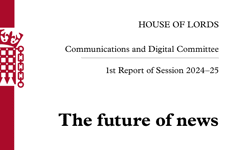
The College of Policing must work with the news industry to rebuild and promote a “new era of co-operation and communication” between police forces and accredited media, the Society of Editors has said.
The Society’s comments follow the publication yesterday of the College of Policing’s review into Lancashire Police’s handling of the investigation into the disappearance of Nicola Bulley earlier this year. The mother-of-two disappeared while walking her dog in the village of St Michael’s on Wyre on 27 January with her body found more than three weeks later on 19 February. The review sought to establish learnings for Lancashire Constabulary following the investigation as well as wider policing more generally.
Findings from yesterday’s report, which the Society of Editors submitted evidence to, include a recognition that relations between the police and the media remain ‘fractured’ and that action is needed to ‘rebuild’ and strengthen it for the benefit of the public. The review also found that the failure by Lancashire Police to brief the mainstream media on a non-reportable basis on Ms Bulley’s vulnerabilities at an early stage of the investigation meant that a vacuum of information allowed speculation to run unchecked and ultimately led to the force’s ‘avoidable and unnecessary’ decision to release personal information about her which was widely criticised. The review recommended that, moving forward, media briefings should be actively encouraged if there is a policing purpose to doing so.
Supporting the recommendation for more routine use of background briefings, the Society also called for a review of national guidance on police and media relations and more trusted dialogue between officers and journalists.
Dawn Alford, executive director of the Society said yesterday: “The College of Policing’s review rightly recognises that urgent action is needed to re-set and rebuild the relationship between the police and the media which, for too long, has been mired by wrongful perceptions and mistrust.
“As was evident during the investigation into Ms Bulley’s disappearance, the rise of social media now means that, unlike content published by regulated news platforms, misinformation and conspiracy theories have the power to spread like wildfire and, as such, the College of Policing must ensure that national guidelines take into account the impact of social media on policing and investigations. This includes a recognition that, where there is a vacuum of information, this can be filled by social media speculation and conspiracy theories.
“Following today’s publication, the College should now look to review its national guidance on police and media relations and include a requirement for all forces to routinely consider giving background briefings to accredited journalists during high-profile and fast-moving investigations. Such briefings can be hugely beneficial in not only assisting the police in communicating information to the public but also allow newsrooms to make informed decisions on how best to frame coverage as well as countering false information that may be circulating elsewhere.
“A successful working relationship between police forces and journalists remains essential to policing legitimacy and, in order to restore public confidence, the College must now work with the industry to usher in a new era of communication and co-operation which promotes an assumption of trust between officers and journalists as well as more trusted dialogue. The Society will now look to meet with policing bodies to discuss the review’s findings in more detail and explore how we might work together to re-set this important relationship.”
The College of Policing’s review was commissioned earlier this year by Andrew Snowden, the Lancashire Police and Crime Commissioner, with its terms of reference including the investigation and search for Ms Bulley, communication and public engagement and the releasing of personal information by Lancashire Constabulary.
The report also recommends a review of media engagement guidance available to families as well as communications training for Senior Investigating Officers and other specialist officers, particularly in high-profile cases. The review also recommends that forces should consider whether it is appropriate for them to read out statements on behalf of families which offer comment beyond an investigation. This follows the review’s finding that it was ‘not appropriate’ for a police spokesperson to read out a statement on behalf of Nicola Bulley’s family which contained criticism of the media which, it concluded, ‘failed to draw a distinction between mainstream media and social media’.
Keep up-to-date with publishing news: sign up here for InPubWeekly, our free weekly e-newsletter.











